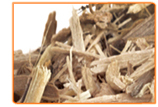How Can I Increase my Intake of Ginseng?
 When you're experiencing menopause, it can seem like there's simply no relief from the myriad of symptoms you're suffering from. Vaginal dryness, hair loss, anxiety disorders; these are all common symptoms of menopause. But there are ways that can help you to combat your symptoms of menopause.
When you're experiencing menopause, it can seem like there's simply no relief from the myriad of symptoms you're suffering from. Vaginal dryness, hair loss, anxiety disorders; these are all common symptoms of menopause. But there are ways that can help you to combat your symptoms of menopause.
One phytoestrogenic herb that can help ease the trauma of menopause is ginseng. Although it is difficult to get enough ginseng in your diet.
Ginseng
Ginseng is a herb that grows predominantly in the northern hemisphere. There are eleven types of true ginseng, but there are other plants that have ginseng in their common name, such as Siberian Ginseng. You can tell whether a plant is true ginseng because it will include Panax in its Latin name.
How Ginseng Can Help You
Ginseng has lots of uses. Traditionally, it has been used as an aphrodisiac and as a treatment for erectile dysfunction in men. Ginseng is also an adaptogenic herb; a type of herb that is believed to increase resistance to stress, trauma, anxiety and fatigue, helping the body return to a balanced state.
 This versatile plant may also be able to offer you relief from your symptoms of menopause. This may be possible because ginseng contains phytoestrogens, which, when consumed, may have the potential to replace the low levels of estrogen that can occur in your body during menopause. Read on to learn how you can incorporate ginseng into your diet.
This versatile plant may also be able to offer you relief from your symptoms of menopause. This may be possible because ginseng contains phytoestrogens, which, when consumed, may have the potential to replace the low levels of estrogen that can occur in your body during menopause. Read on to learn how you can incorporate ginseng into your diet.
Are You Getting Enough?
It's one thing knowing what's good for you, but it's another actually putting this knowledge into practice. Thankfully, it's easy to put ginseng into your life. You could try replacing your usual snack with ginseng root. Ginseng root is easy to get hold of from most health food stores and has a pleasant fleshy texture, making it a healthy and revitalizing snack.
You could also try experimenting with ginseng; have a bowl of ginseng soup or enjoy a ginseng tea break. Both are easy to prepare, simply boil ginseng root until it has infused. You can add your choice of ingredients to the soup, but the tea can be enjoyed on its own.
Click the following link if you want to learn more about herbs for menospause relief.



























